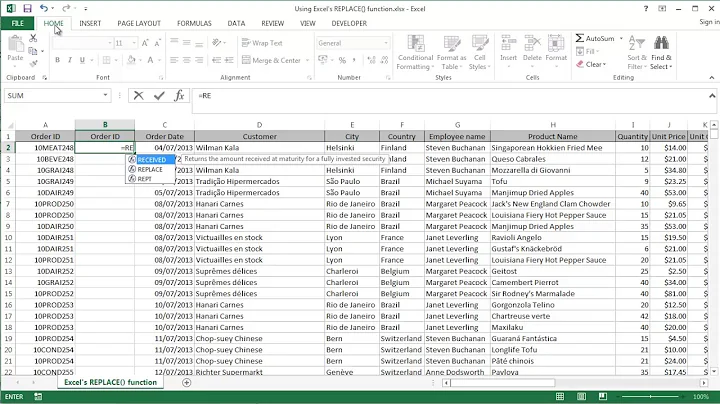Replace all values in one column to 1
41,915
Solution 1
awk '{print $1, $2, "1"}' inputfile
Solution 2
try
awk
awk '{$3=1 ; print ;}' oldfile > newfile
$3 = 1will set third field to 1
sed (here GNU or busybox sed with its -i option for in-place editing)
sed -i 's/[0-9.]*$/1/' file
[0-9.]*$is a sequence from0to9and.up to the end of line.
sed (golfed 4 bytes)
sed -i 's/[^ ]*$/1/' file
[^ ]*$any char other than space, until end of line.
Solution 3
The lines in your expected output seem to end in two space characters and have fields separated by one tab and one space character.
If that's indeed what you want, then you'd need:
awk -v 'OFS=\t ' '$3="1 "' < infile > outfile
Or with sed:
tab=$(printf '\t')
sed "
s/[[:blank:]]\{1,\}/$tab /g
s/[^[:blank:]]\{1,\}[[:blank:]]*$/1 /
s/^[[:blank:]]*//" < infile > outfile
Solution 4
Simply with GNU sed, using -i to replace text directly in the file:
sed -i 's:\(.*\s\)\(.*\s\)\(.*\):\1\21:g' textfile
The columns are matched by regex groups in the parenthesis, reusing them with \1 and \2 and then using a "1" to replace the last group.
In this use case, the solution proposed using awk is nice and short as well.
Solution 5
this will do the job:
cat textfiles | cut -d' ' -f-2 | sed 's/$/ 1/'
Related videos on Youtube
Author by
user203269
Updated on September 18, 2022Comments
-
user203269 over 1 year
I have multiple text files containing 12 lines and 3 columns.
Example:
2 6 0.74 42 6 0.58 80 6 0 112 6 0.24 132 6 1 216 6 0.7 342 6 0 390 6 0.21 432 6 0.56 466 6 0.75 524 6 0.6 646 6 0.9I want to set all the values of the third column to 1 in all lines.
The output should look like this :
2 6 1 42 6 1 80 6 1 112 6 1 132 6 1 216 6 1 342 6 1 390 6 1 432 6 1 466 6 1 524 6 1 646 6 1Does anyone know a command that can solve this problem?
-
 Ipor Sircer over 7 yearsLet's codegolf:
Ipor Sircer over 7 yearsLet's codegolf:sed 's/[^ ]*$/1/':-> -
user203269 over 7 yearsThank you so much! :) The awk seems to work, except for the first line: 2 6 1 6 1 80 6 1 112 6 1 132 6 1 216 6 1 342 6 1 390 6 1 432 6 1 466 6 1 524 6 1 646 6 1 The first line prints the 2nd and 3rd value twice?
-
Арсений Черенков over 7 years@user203269 awk version works fine for me (albeit with a formating issue)
-
 Stéphane Chazelas over 7 years
Stéphane Chazelas over 7 yearsawkgolfed:awk \$3=1(POSIX but would not work with the awk from the 70s as found in /bin on Solaris) -
magor over 7 yearsthat
awksolution is really cool....can you explain pls -
 Stéphane Chazelas over 7 years@123, like I said, in the OP's expected output, every line ends in two space characters.
Stéphane Chazelas over 7 years@123, like I said, in the OP's expected output, every line ends in two space characters. -
 123 over 7 yearsMisread thought you said fields were separated by two space and a tab. my bad.
123 over 7 yearsMisread thought you said fields were separated by two space and a tab. my bad. -
user203269 over 7 yearsThis command prints out the first line in the textfile corrrectly in terminal, but does not make changes in the file...
-
user203269 over 7 yearssed -i 's/[0-9.]*$/1/' File.txt gives this error: sed: 1: "File.txt": invalid command code L
-
 Stéphane Chazelas over 7 years@user203269, on BSDs, use
Stéphane Chazelas over 7 years@user203269, on BSDs, use-i ''instead of-i -
user203269 over 7 yearscat file.txt | cut -d' ' -f-2 | sed 's/$/ 1/' 646 6 0.5 1 prints out one line (the last line) in the terminal, but does not change the file.txt...
-
user203269 over 7 yearsi '' : It does not give the error , but it does not make any changes to the textfile...
-
user203269 over 7 yearsHi Stephane, This awk does the first three values correctly, then it deletes column1 line 2 and continues without making changes..
-
 Stéphane Chazelas over 7 years@user203269, convert your file from MS-DOS to Unix first.
Stéphane Chazelas over 7 years@user203269, convert your file from MS-DOS to Unix first. -
user203269 over 7 yearsThank you Stephane! How do I do that? :)
-
user1700494 over 7 yearsredirect the output to another file
awk '{print $1, $2, "1"}' inputfile > newfile -
user203269 over 7 yearsThanks! It works but only writes out the first line, column 1, 2 and 3. I would like to write out all 12 lines in the same manner :)
-
 kemotep about 6 yearsCould you please edit your post to include more context as to why you feel this is the solution?
kemotep about 6 yearsCould you please edit your post to include more context as to why you feel this is the solution?





